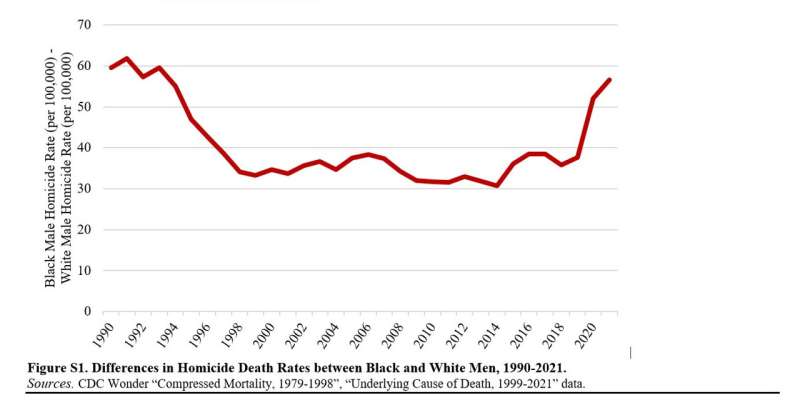This article has been reviewed according to Science X's editorial process and policies. Editors have highlighted the following attributes while ensuring the content's credibility:
fact-checked
peer-reviewed publication
trusted source
proofread
Homicide rates are a major factor in the gap between Black and white life expectancy, suggests study

Homicide is a major reason behind lower and more variable reduction in life expectancy for Black rather than white men in recent years, according to a new study published August 21, 2024 in the open-access journal PLOS ONE by Michael Light and Karl Vachuska of the University of Wisconsin-Madison, U.S..
The COVID-19 pandemic precipitated a staggering drop in U.S. life expectancy and substantially widened Black-white disparities in lifespan. It also coincided with the largest one-year increase in the U.S. homicide rate in more than a century, with Black men bearing the brunt of these.
Despite these trends, there has been limited research on the contribution of homicide to Black-white disparities in life expectancy during the pandemic.
In the new study, researchers used mortality data and multiple cause of death data files from the National Vital Statistics System division of the National Center for Health Statistics. The data spanned 2019 to 2021, and causes of death were organized into 20 main groupings.
Whereas Black men were expected to live on average 71.4 years in 2019, this dropped to 67.7 years in 2020. For white men, the corresponding decline was only from 76.4 years to 74.9 years. As a result, the life expectancy racial gap jumped from 5.0 to 7.2 fewer years for Black relative to white men.
The researchers found that in 2020 and 2021, homicide was the leading contributor to inequality both in life expectancy and in lifespan variability between Black and white men. Homicide accounted for far more of the racial gap in longevity and lifespan variability than deaths due to COVID-19. In 2021, for instance, the impact of homicide on the racial gap in lifespan variability was nine times greater than deaths from COVID-19.
The authors conclude that addressing homicides should be at the forefront of any public health discussion aimed at promoting racial health equity.
The authors add, "Increased homicide is one of the principal reasons why lifespans have become shorter for Black men than white men in recent years. In 2020 and 2021, homicide was the leading contributor to inequality in both life expectancy and lifespan variability between Black and White men, accounting for far more of the racial gap in longevity and variability than deaths from COVID-19."
More information: PLoS ONE (2024). DOI: 10.1371/journal.pone.0308105





















